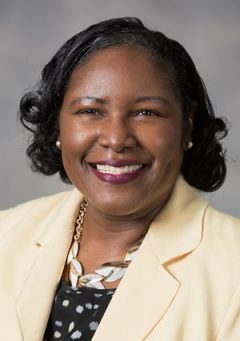The Elon Community Accessibility Team will strengthen the commitment to an accessible and inclusive environment for all members of the Elon community.
The Elon Community Accessibility Team (ECAT) held its inaugural meeting on March 25. During the meeting, President Connie Ledoux Book delivered the committee’s charge.
“This joint initiative answers the demand to recognize the changing world we share, and our responsibility to attend to and meet the needs of all members of our communities,” according to the team’s charter.
ECAT focuses on education and training, compliance and advocacy, and organizes three working groups that will meet regularly to plan and assess the goals of the committee in those areas. ECAT will not replace existing committees or units focused on access, inclusion and equity. Instead, the work is structured to promote communication and cooperation across several units within the university and town.
 The committee’s co-chairs are Prudence Layne, associate professor of English, Laké Laosebikan-Buggs, director of inclusive excellence for graduate and professional students, and Mary Kathryn Harward, Elon town planner.
The committee’s co-chairs are Prudence Layne, associate professor of English, Laké Laosebikan-Buggs, director of inclusive excellence for graduate and professional students, and Mary Kathryn Harward, Elon town planner.
“We have a talented and dedicated group of Elon University employees and Town of Elon partners ready to roll up their sleeves to make sure that we enhance equity and access for our shared residents and visitors,” said Layne.
With representation from the town and university units that continue to be engaged in advocacy for people with disabilities, the experience was evident at the ECAT meeting.
“I learned so much and you could tell there was so much experience in the room,” Harward said. “They’ve been doing this for years and know the importance of making a community livable. As a planner, that’s my goal, to make the community livable for everyone.”
ECAT is the result of the “long-standing work of the Office of Disabilities Resources, which continues ‘to support a diverse population of students with disabilities,’” ECAT’s charter states. Additionally, it builds on the work of the university’s Academic Council to champion faculty with disabilities and the Advocates for the Differently Abled Employee Resource Group (ADA ERG).
Layne was a member of Academic Council and in need of accommodations. “I realized that the institution had not built an adequate infrastructure for employees with disabilities,” Layne said, “So, I began to build it.”
Layne and colleagues successfully strengthened the policy and guidelines in the Faculty Handbook to support employees with disabilities.
In 2018 Academic Council and the Center for the Advancement of Teaching and Learning (CATL) collaborated to educate and raise awareness about resources for people with disabilities and training those interacting with them.
Initially, Associate Professor of Psychology Katie King led a CATL-sponsored reading group. It progressed into the ADA ERG, which is coordinated by King, Layne and Tina Kissell, assistant director of disabilities resources.
“The ERG elevated the contributions and needs of faculty and staff with disabilities,” according to the committee’s charter, which led to a new accessibility resource page for current and potential employees on the university’s Human Resources website.
In 2019 the ERG led campus-community discussions throughout the year and provided evidence of the need to increase institutional collaboration.
In March 2020, Elon Town Manager Richard Roedner initiated the process of reevaluating the town’s accessibility resources for residents, workers and visitors. That summer, the university announced the creation of the Division of Inclusive Excellence, which provided a framework of community access.
Before, the work was focused on university services, but the ERG recognized the connection and need for partnership. “President Book approved the creation of ECAT, which will link key and strategic stakeholders from across the university and Town of Elon,” according to ECAT’s charter.
“The time is now for the ECAT initiative,” Layne said.
The public-private partnership is supported by the Town of Elon’s strategic plan, which calls for strong community partnerships and engagement. The goal is to “maintain ongoing, positive and productive partnerships that acknowledge our interconnectedness and our shared responsibility for the future success of our community. And the work will contribute to the call for an unprecedented commitment to Inclusive Excellence in Boldly Elon, Elon University’s strategic plan for 2030.”
ECAT Committee members are:
- Prudence Layne, Associate Professor of English (Co-Chair)
- Mary Kathryn Harward, Planner with the Town of Elon (Co-Chair)
- Laké Laosebikan-Buggs, Director of Inclusive Excellence for Graduate and Professional Education (Co-Chair)
- Martin Baker, Senior Associate Athletics Trainer
- T.J. Bowie, Equal Opportunity and Human Resources Compliance Manager
- Tom Flood, Assistant Vice President of Physical Plant
- Robert Johnson, Director of Event and Space Management
- Susan Kirkland, Associate Vice President for Finance and Administration
- Tina Kissell, Assistant Director of Disabilities Resources, ADA ERG Co-Chair
- Torii Masinsin, Associate Director of Admissions for Campus Visits
- Kelly Reimer, Director of Teaching and Learning Technologies
- Nita Skillman, Director of Interprofessional Simulation
- Chase Solomon, Class of 2023 President and Member of the Student Inclusive Campus Committee
- Susan Wise, Director of Disabilities Resources
- Molly Zlock, Director of HR Compliance, Equal Opportunity and Title IX



